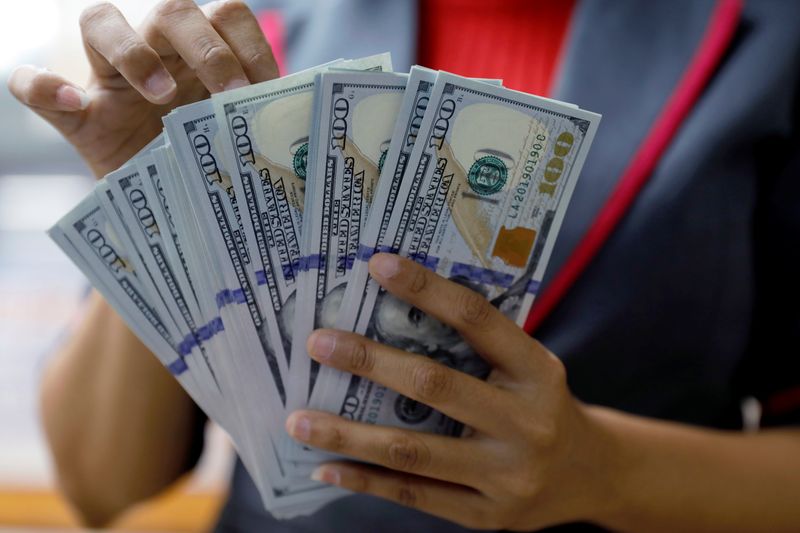 © Reuters. An employee counts U.S. dollar banknotes at a currency exchange office in Jakarta, Indonesia October 23, 2018. REUTERS/Beawiharta
© Reuters. An employee counts U.S. dollar banknotes at a currency exchange office in Jakarta, Indonesia October 23, 2018. REUTERS/Beawiharta
(Refiles to correct first sentence to fix day of week to Tuesday)
By Chuck Mikolajczak
NEW YORK (Reuters) - The dollar index retreated on Tuesday after a host of economic data releases indicated the U.S. economy remains resilient and may not be close to a recession, while the euro strengthened after comments from European Central Bank (ECB) President Christine Lagarde.
The greenback retreated further after data showed new orders for U.S.-manufactured capital goods unexpectedly rose in May, although the prior month was revised down, indicating some caution remained among businesses for new capital investment.
But the dollar pared declines somewhat after a separate reading on consumer confidence from the Conference Board showed its index rose to 109.7 in June, the highest since January 2022, from 102.5 in the prior month.
Additional data on single-family new home sales in May and home prices in April also indicated the housing market has been able to weather rising interest rates from the U.S. Federal Reserve.
"The problem is there's no indication that a recession is coming, you don't see it in any of the statistics, what you have is a historical paradigm where when the Fed raises rates at this speed and to this extent you get a recession," said Joseph Trevisani, senior analyst at FXStreet.com.
"That's the model everyone's looking at - models don't always work, you know."
The dollar index fell 0.234% at 102.490. The Japanese yen weakened 0.36% versus the greenback at 144.02 per dollar after softening to as much as 144.02, its weakest since Nov. 10 as investors eyed a possible intervention by the Bank of Japan (BOJ), which last intervened in the yen when it traded around 145 per dollar.
Morgan Stanley (NYSE:MS) said on Tuesday it was now expecting the Fed to hike its key interest rate by 25 basis points in July, from an earlier estimate of a pause, raising its terminal rate forecast to 5.375%.
Earlier on Tuesday, Japan's Finance Minister Shunichi Suzuki warned of a response should the currency continue to depreciate.
The Japanese currency has come under pressure as the Bank of Japan has maintained its soft monetary policy, while central banks around the globe have embarked on a rapid path of hiking interest rates to combat stubbornly high inflation.
The euro was up 0.49% to $1.0957 after climbing to $1.0976, the highest since June 22, after comments from ECB officials.
Lagarde said inflation in the euro zone had entered a new phase that could linger for some time, and "it is unlikely that in the near future the central bank will be able to state with full confidence that the peak rates have been reached".
Other ECB policymakers weren't anticipating clear evidence
inflation is easing enough that would enable the central bank to pause their interest rate hikes.
The euro rose 0.84% against the yen at 157.830. Sterling was last trading at $1.2745, up 0.26% on the day.
Federal Reserve Chair Jerome Powell, Bank of England governor Andrew Bailey, and Bank of Japan Governor Kazuo Ueda are scheduled to speak at a panel with Lagarde on Wednesday.
The Russian rouble weakened 1.24% versus the greenback at 85.47 per dollar and was on pace for a fourth straight session of declines after touching its weakest level since March 2022 on Monday.
Russian mercenary leader Yevgeny Prigozhin arrived in Belarus under a deal that ended a brief mutiny against the Russian military by his fighters, while President Vladimir Putin praised his armed forces for preventing a civil war.
(This story has been refiled to correct the day of the week to Tuesday in paragraph 1)

